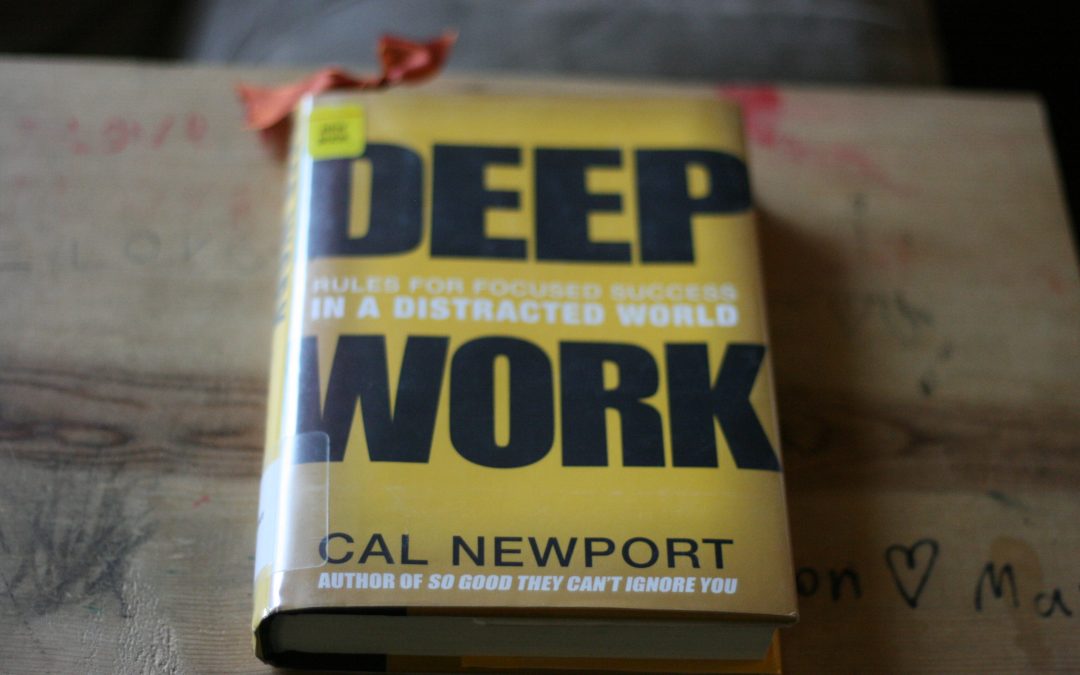Deep Work: Rules for Focused Success in a Distracted World, by Cal Newport, is a book about cultivating more deep work in your life. Deep work is defined as the ability to focus without distraction on a cognitively demanding task.
I can’t say enough about this book. Truly. Many of the principles in it are things that I intuitively set up in my own work life, but all of them were good reminders for me. And, in the distracted world in which we find ourselves today, I can’t think of a more valuable book to teach us about how to develop our focus and increase our meaningful work without demanding more time from our schedules.
Newport is a very cut and dry personality, and that comes through in his writing. He has some extreme ideas about productivity and ways that we can better use our time and increase our deep work practice. I agree with his ideas, but I suspect that some people, who maybe aren’t as rigid as I am, might not. Still, this book is incredibly valuable for helping us work our way toward less distracted work time.
Newport is a professor and doesn’t argue that distractedness is bad; he just argues that deep work is better. He then outlines the ways that we can actually increase our ability to perform deep work in a meaningful manner. The principles and strategies were communicated in a very clear and concise manner, without professor-speak, which I appreciated. Newport wove his strategies in with his examples of other deep workers in all sorts of fields, from blacksmithing to computer programming to writing.
One of my favorite things about this book was that Newport detailed other people’s deep work practices and gave many different ideas that were not just his own. This helps readers to see from a variety of experiences and choose from many different methods.
I learned some very practical solutions for determining what sorts of deep work I’ll do and how to increase my deep work practice and, maybe even more importantly, what sort of shallow work would be worth my time and energy. I learned how to analyze where my time is going and the purpose behind those to-do list items. One of my biggest struggles is trying to determine whether what I’m focusing on is the best use of my limited time. There are some things that have crept into my schedule simply because every other writer I know does it. Well, that doesn’t mean it’s good for me. Newport’s book helped me clarify all of that–and gave me permission to quit if I needed to.
With the more than 3,000 words of notes I took from reading this book, I’ll deepen my own deep work practice and use Newport’s strategies to analyze everything I’m currently doing in light of deep and shallow work. I don’t want to do more than 40 percent shallow work, because the deep work is the work that really matters. It’s true that it’s necessary to do some shallow work, but if I can strategically limit that shallow work, I’ll open up more time for the things that really matter to me.
I also really enjoyed that Newport gave readers permission to hide away and not feel badly about it—not that I’m going anywhere anytime soon. But maybe, at some point in the future, I’ll be like Henry David Thoreau. You know, when my kids are grown. Because a place in the woods, with six kids crammed inside, doesn’t feel much like a Walden.
*The above is an affiliate link. I only recommend books I find valuable myself. I don’t even actually talk about the books I don’t find valuable, because I try to forget I wasted time on them.


